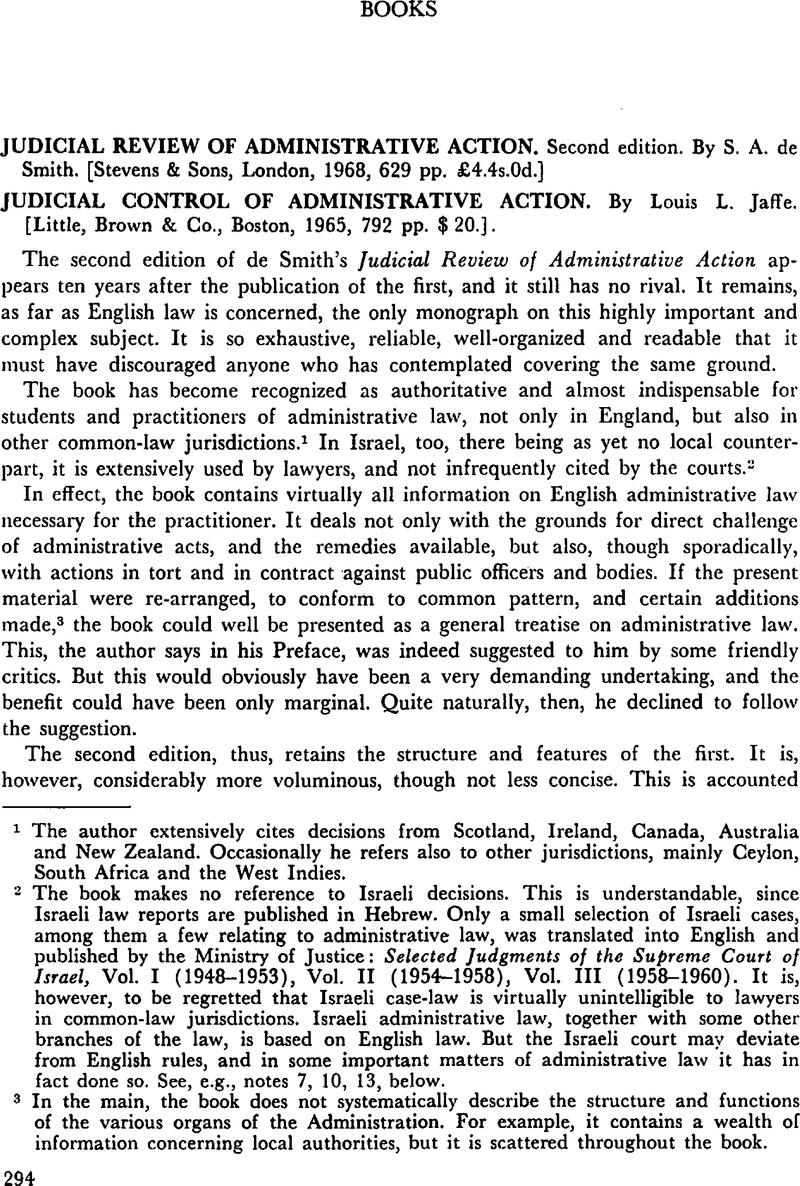No CrossRef data available.
Article contents
Judicial Review of Administrative action. Second edition. By S. A. de Smith. [Stevens & Sons, London, 1968, 629 pp. £4.4s.0d.] - Judicial Control of Administrative action. By Louis L. Jaffe. [Little, Brown & Co., Boston, 1965, 792 pp. $ 20.].
Published online by Cambridge University Press: 12 February 2016
Abstract

- Type
- Books
- Information
- Copyright
- Copyright © Cambridge University Press and The Faculty of Law, The Hebrew University of Jerusalem 1969
References
1 The author extensively cites decisions from Scotland, Ireland, Canada, Australia and New Zealand. Occasionally he refers also to other jurisdictions, mainly Ceylon, South Africa and the West Indies.
2 The book makes no reference to Israeli decisions. This is understandable, since Israeli law reports are published in Hebrew. Only a small selection of Israeli cases, among them a few relating to administrative law, was translated into English and published by the Ministry of Justice: Selected Judgments of the Supreme Court of Israel, Vol. I (1948–1953), Vol. II (1954–1958), Vol. III (1958–1960). It is, however, to be regretted that Israeli case-law is virtually unintelligible to lawyers in common-law jurisdictions. Israeli administrative law, together with some other branches of the law, is based on English law. But the Israeli court may deviate from English rules, and in some important matters of administrative law it has in fact done so. See, e.g., notes 7, 10, 13, below.
3 In the main, the book does not systematically describe the structure and functions of the various organs of the Administration. For example, it contains a wealth of information concerning local authorities, but it is scattered throughout the book.
4 See de Smith, Judicial Review of Administrative Action (2nd ed.) 37–45.
5 Town and Country Planning (Inquiries Procedure) Rules 1965 (S. I. 1965 No. 473); Compulsory Purchase by Local Authorities (Inquiries Procedure) Rules 1962 (S.I. 1962 No. 1424); and Compulsory Purchase by Ministers (Inquiries Procedure) Rules 1967 (S.I. 1967 No. 720). These rules are dealt with especially in connection with the right to a hearing: ibid. 181 et seq. A special appendix is devoted to the Town and Country Planning Bill of 1967, which made important changes in town planning and compulsory acquisition procedures: ibid. 597–599. The Bill recently became law: Town and Country Planning Act 1968 (c. 72).
6 [1964] A.C. 40.
7 See de Smith, op. cit., esp. pp. 154–161. It is interesting to note that the Supreme Court of Israel refused to follow the English decisions of the 1950s, and held that a right to a hearing should be extended to any case in which an administrative decision, whether or not of a quasi-judicial nature, affects a citizen in his person, property, occupation, status and the like: Berman v. Minister of Interior (1958) 12 P.D. 1493 (published also in Selected Judgments of the Supreme Court of Israel, Vol. 3, pp. 29–52).
8 [1967] 1 W.L.R. 1031.
9 Duncan v. Cammell, Laird & Co. [1942] A.C. 624.
10 See de Smith, op. cit., Appendix 3, pp. 600–606. A similar decision was given by the Supreme Court of Israel ten years earlier: Ha'Etzni v. Ben Gurion (1957) 11 P.D. 403 (published also in Selected Judgments of the Supreme Court of Israel Vol. 3, pp. 365–382). See Harnon, E., “Evidence Excluded by State Interest” (1968) 3 Is.L.R. 387–415Google Scholar; Livneh, E., “Crown Privilege Controlled” (1969) 85 L.Q.R. 17.Google Scholar
11 e.g., “Aspects of Habeas Corpus” (pp. 589–596); “Are There Unreviewable Discretionary Powers?” (pp. 271–280).
12 Especially the first (“Introductory”) chapter, which presents the background, general characteristics and trends of judicial review in England, and the fourth chapter (“The Right to a Hearing”).
13 In Israel it was repeatedly held that regulations made by a Minister were subject to review by the courts as much as local by-laws. See, e.g., A.-G. v. M. Dizengoff & Co. Navigation Ltd. (1959) 13 P.D. 1026 (published also in Selected Judgments of the Supreme Court of Israel, Vol. 3, pp. 53–70).
14 Cf. Zamir, , The Declaratory Judgment (1962) 157Google Scholaret seq.
15 It seems that the rule as stated is not adequately supported by the leading authority on this point (Simms Motor Units Ltd. v. Minister of Labour and National Service [1946] 2 All E.R. 201) or by the other authorities cited, and it may be doubted whether, as a matter of practice, it is generally followed by administrative authorities.
16 Wyman, B., The Principles of the Administrative Law Governing the Relations of Public Officers (1903)Google Scholar; Goodnow, F.H.J., Principles of the Administrative Law of the United States (1905)Google Scholar.
17 Especially, Gellhorn, W. and Byse, C., Administrative Law—Cases and Comments (4th ed. 1960).Google Scholar
18 The notable exception is Davis, K. C., Administrative Law Treatise (1958).Google Scholar
19 See Apelbom, A. M., “Common Law a l'américaine” (1966) 1 Is.L.R. 562–579Google Scholar. Unfortunately, Jaffe's book is not adequately known or used in Israel.
20 See especially Wade, H.W.R., “Anglo-American Law: Some Reflections” (1965) 81 L.Q.R. 357–379Google Scholar; “Anglo-American Administrative Law: More Reflections”. (1966) 82 L.Q.R. 226–252.
21 Professor Jaffe has recently come out in defence of English administrative law. But he too seems to agree that the English system of remedies is defective. See Jaffe, Louis L., “Research and Reform in English Administrative Law” (1968) Public Law 119, at 130–133Google Scholar. He was answered by ProfessorsMitchell, J. D. B. and Garner, J. F. in (1968) Public Law 201–216Google Scholar.
22 See Wade, H.W.R., “Anglo-American Administrative Law: More Reflections” (1966) 82 L.Q.R. 226 at 247–252.Google Scholar
23 Davis, K. C., “Judicial Review of Administrative Action: A Review” 66 Col.L.R. 635–678CrossRefGoogle Scholar.
24 For example, review of “political questions” (pp. 490–494) is indexed only under the heading “Standing”; the “substantial evidence” rule (pp. 600 et seq.) as such is not indexed at all; and so also, it seems, “exclusion of judicial review” (pp. 353 et seq.).


